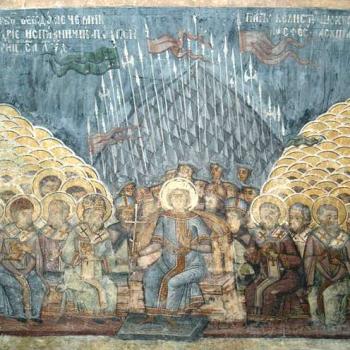When we pray God’s Word back to Him, the Holy Spirit is praying with us and for us. Praying the Psalms is a profound devotional activity. But the Bible also has many profound prayers that are extremely short, yet applicable for much of what we need to pray for. They are so short that they can constantly be in our hearts and on our lips.
This last prayer of the Bible is the core of the Table Prayer
so popular among Lutherans: “Come, Lord Jesus,/Be Our Guest/And Let Thy Gifts to Us be Blest.” For a long time after I had become a Lutheran I didn’t think much of this, considering it to be just a child’s prayer. Later, though,
I came to appreciate it and use it for its apocalyptic meaning and for its theme of vocation (God really is present as He gives us our daily bread through all of the vocations involved as we sit around our tables).
But this short prayer from the Bible has wide applicability, and it called to mind a number of others.
Come, Lord Jesus [Revelation 22:20]. I’ve heard my daughter say this–actually, I realize now, pray this–many times in this trouble-filled year of 2020. It’s good to pray when we are overcome with how messed up this world is. We are asking for Christ to come back to end this fallen world of sin and tragedy and to bring about the resurrection of the dead and the New Heaven and New Earth.
Lord, have mercy. [Matthew 20:30] This prayer of the two blind men whom Jesus healed may be the one we need most often and in the most circumstances. We can pray it when we need forgiveness, when we need help, and when other people need forgiveness and help.
This Biblical prayer has been expanded into the Jesus Prayer used in Eastern Orthodoxy: “Lord Jesus Christ, Son of God, have mercy on me, a sinner.” This has become a staple of Orthodox spirituality and meditation. See also how it features in my favorite novel by J. D. Salinger, Franny & Zooey. It’s also the “Kyrie” (the Greek word for “Lord”) in the liturgy: “Lord have mercy, Christ have mercy, Lord have mercy.”
Praise the Lord. [Psalm 106:1, among many others] To “praise” God does not just mean telling Him how good He is, though this often happens in praising. The term derives from a word for “shine,” so that it connotes responding to the great light of God. Thus, praising the Lord involves celebrating God and reveling in Him. Nor is this phrase, as it seems in the English imperative, to be just an exhortation for other people that they should praise Him. This is one of those linguistic curiosities in which to use the word is to perform the action.
This is good to pray when you are thankful to Him, when you are conscious of both His benefits and who He is in Himself. If you want to pray in tongues–that is, in a foreign language–you can use the original Hebrew for this phrase: Hallelujah!
“Come, Lord Jesus” is one of those super-short prayers that is always appropriate, like “Lord, have mercy,” “Forgive me, Lord,” and “Thank you, Lord.” (in Bible?) “Praise the Lord.” “Bless the Lord” (what does that mean, exactly?) “Lord, I believe; help my unbelief.”
I give you thanks, O Lord. [Psalm 138:1, and others] For when we feel gratitude for God and for His gifts. I think of the line about how one of the worst things about being an atheist is when you feel grateful but have no one to thank.
“I believe; help my unbelief!” [Mark 9:24] The prayer of the father of the boy with the unclean spirit who brought him to Jesus in the hope that he might be healed. Jesus said that all things are possible for one who believes. The father sort of believed. His was a mixture of belief and unbelief. He asked Jesus to give him belief. And He did as He healed the man’s son. This is good to pray in times of doubt or spiritual struggle. It’s striking how well the Word of God understands us.
Can you think of other prayers from the Bible like these?
Having these on the tips of our tongue can help us to “pray without ceasing.” And to fulfill the rest of that passage: “Rejoice always, pray without ceasing, give thanks in all circumstances; for this is the will of God in Christ Jesus for you” (1 Thessalonians 5:16-18).
Image by mleonascimento0 from Pixabay















